Jetoctopus
Jetoctopus aims to be one of the best on-page SEO tools, providing a web crawler, log analyzer, and Google Search Console (GSC) visualizations, to help identify problems with a website for SEO purposes.
We therefore put it to the test, to see how useful this SEO tool is, how it performs, and how it compares to other SEO tools out there.
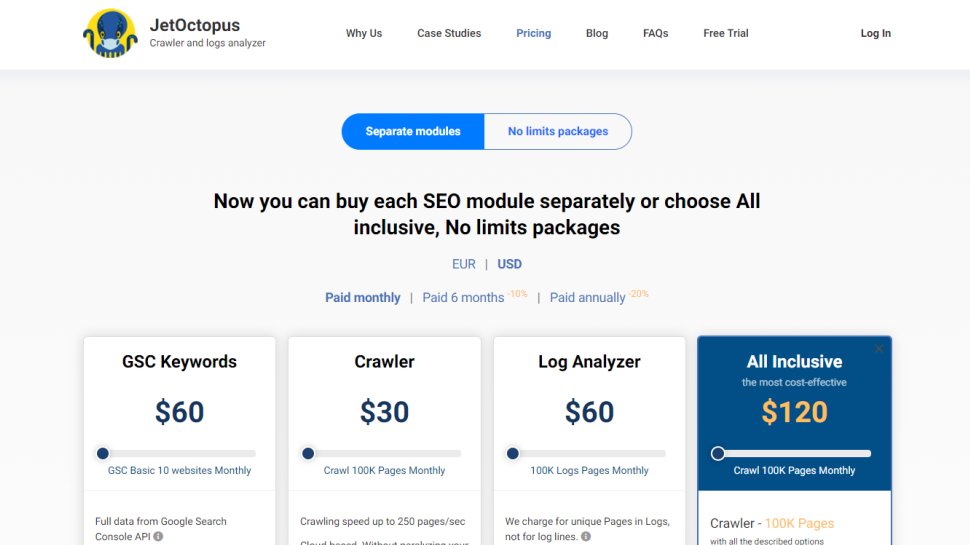
Jetoctopus: Pricing
As mentioned, Jetoctopus provides three different analytics services: crawl, log analysis, and GSC visualization, with pricing determined according to the volume of analysis required. You can subscribe to any of these individually as a module, or alternatively you can opt for an All-Inclusive plan that combines all three.
For the Crawler, pricing starts at $30 a month for up to 10,000 URLs crawled a month, though note that JavaScript pages count as two. This is cloud-based, so it won’t slow your PC, and you can opt for a speed of up to 250 pages crawled a second. The price rises if you need to crawl more, with a top level of $900 a month to crawl up to 8 million pages.
The Log Analyzer allows for 100k pages to be analyzed for $60 a month, with a sliding scale of up to 30 million pages analyzed for $1200. As well as standard metrics there’s the ability to track bot behavior to help eliminate bad actors and improve website efficiency.
For GSC Keywords, you can crawl up to 10 websites for $60 a month, with the option to go as high as 100 websites for $144 a month. All levels allow for 16 months of GSC data to be processed.
The All Inclusive option combines all three modules, with pricing starting from $120 a month for up to 100k pages crawled and 100 log page analyzed.
Alternatively, there is a No Limits package which allows for pages to be crawled and logs to be analyzed as frequently as required each month. There are still limits, but are more generous than the All Inclusive plan. Pricing for this starts from $300 a month for up to 100k pages crawled and up to 400k log pages analyzed, with options to increase these for a corresponding increase in price.
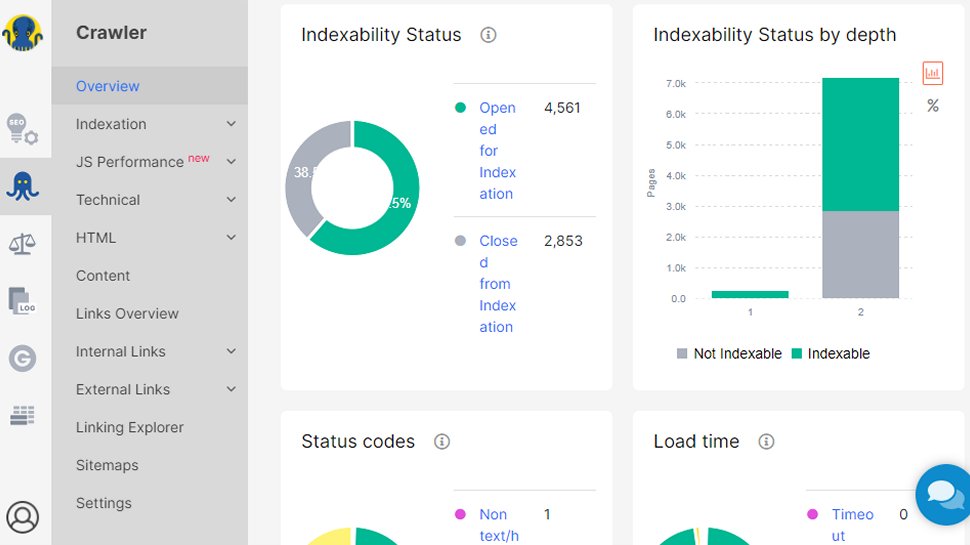
Jetoctopus: Features
Crawler
The crawler runs a check of your websites, identifying and reporting on any issues that may be causing problems for search engines. This includes issues such as missing meta data, redirect issues, and general indexing problems. Visualizations provide information by category, depth, as well as load times and status codes.
Log Analyzer
The Log Analyzer provides information primarily on bots and bot behavior, allowing you to track how Google, Bing, and other search engine bots handle your website and pages, as well as badly behaving bots. This allows for a finer control of which bots can access your websites, as blocking bad actors can improve website performance.
Google Search console
This module allows you to connect your Jetoctopus account to your GSC account. Using this feature allows you to track the performance of your keywords on a daily basis. Visualizations include for pages with up or down movement, which pages bring the most traffic, as well as general ranking positions for your keywords. It also provides information on.
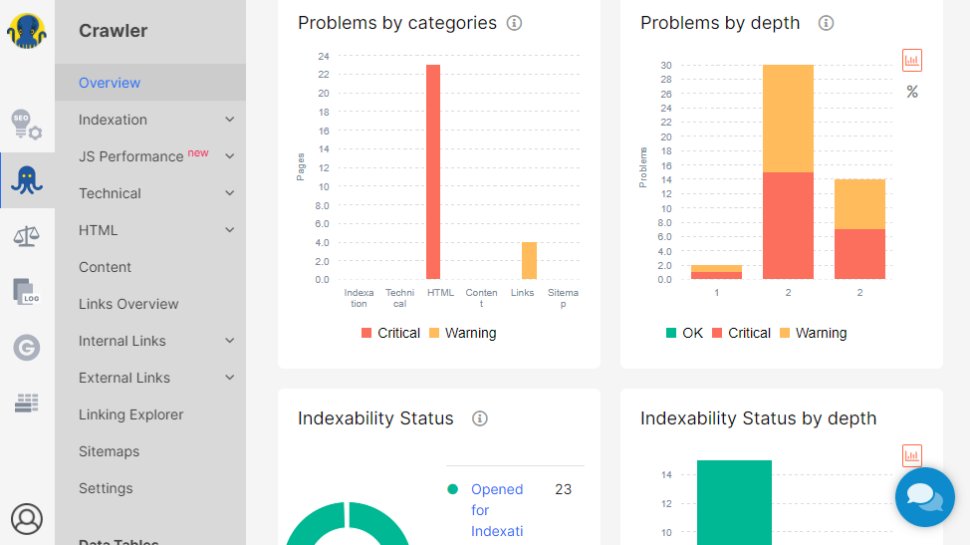
Jetoctopus: Interface and Use
Jetoctopus is relatively easy to use and get started with, though it may take a while for a new user to identify all of the different options and information points they want to work most with. The layout is a simple and easy-to-use three column one, with two narrow navigation columns to the left, and data visualizations presented in the rest of the screen.
The interface packs in a lot of information, but it never looks cluttered. Everything is clearly displayed and differentiated, and it’s easy to navigate between different visualizations and data sets as required. There is quite a lot of information provided, which is good to see though might be initially over-whelming until you can narrow your focus to key pointers.
We did find the crawler was slow to get running. Support is always on hand and we were told that there was an option to increase the number of threads for crawling, though we didn’t see it. This underlines one of the points of the crawler, in that there are quite a number of options available in the advanced settings.
Something we did note is that in the reporting there were some potential technical issues flagged as “critical” that perhaps were not. However, you can create your own filters to drill through the data more efficiently which was good to see. There was also an option to compare crawls, so you can see which issues have been resolved and which have yet to be addressed.
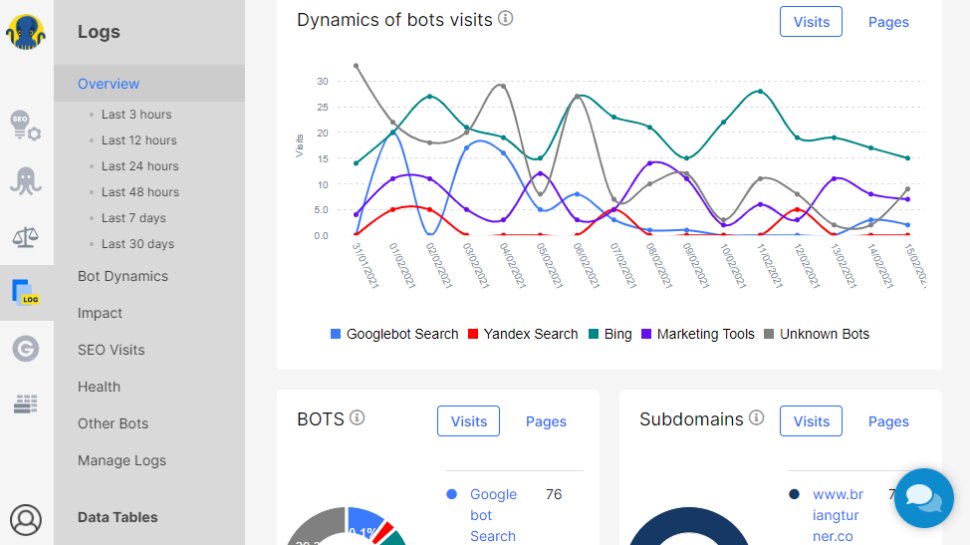
Jetoctopus: Support
Support is very good. Three was a human-user chat box on the website, both at the front end and back end, that you could use to ask for help. Responses were prompt, and were sent to email so you had a copy of the information. There were also email notices provided when crawls had completed, and there are a number of tutorial videos very visibly placed around the tools and website for easy reference as required. All in all, it gave ever impression of a well-supported product.
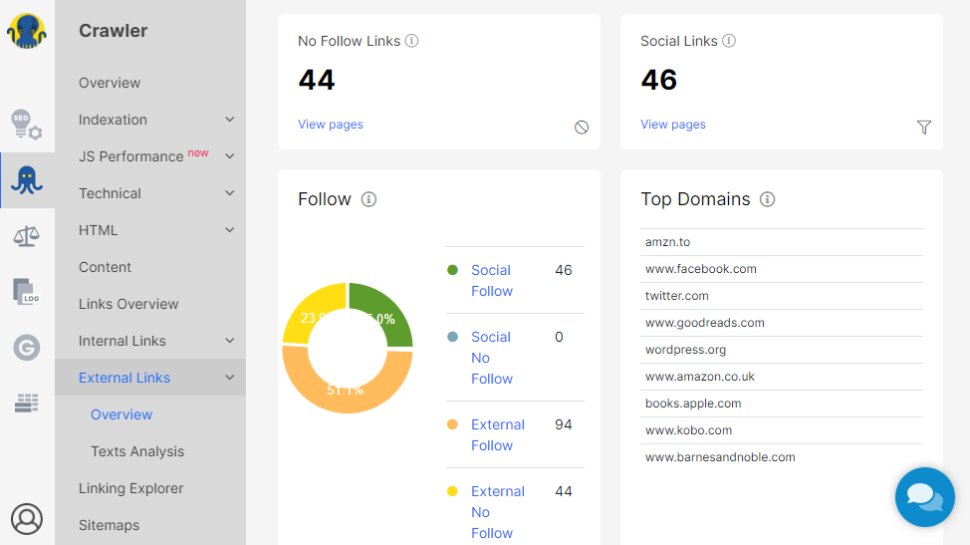
Jetoctopus: The Competition
Jetoctopus is one of a very wide range of SEO analytics tools currently on the market, and competes somewhere between existing established tools such as Ahrefs and the SEO Spider by Screamingfrog. Screamingfrog also offers a crawler to allow for a SEO audit for on-page issues such as meta-data, broken links, and other technical concerns – however, it’s arguably not so detailed or comprehensive as Jetoctopus, but it is cheaper, with a free plan offering upto to 500 URLs to crawl, and the paid version offering unlimited for less than $200 a year.
Ahrefs, on the other hand, is one of the most comprehensive SEO tool platforms out there, and includes a crawler as part of its Site Audit feature. There’s a lot of overlap in the reporting information between Ahrefs and Jetoctopus, but with pricing starting from $99 a month for Ahrefs it is the more expensive option – but also the more comprehensive, with a very wide range of other additional SEO tools bundled in.
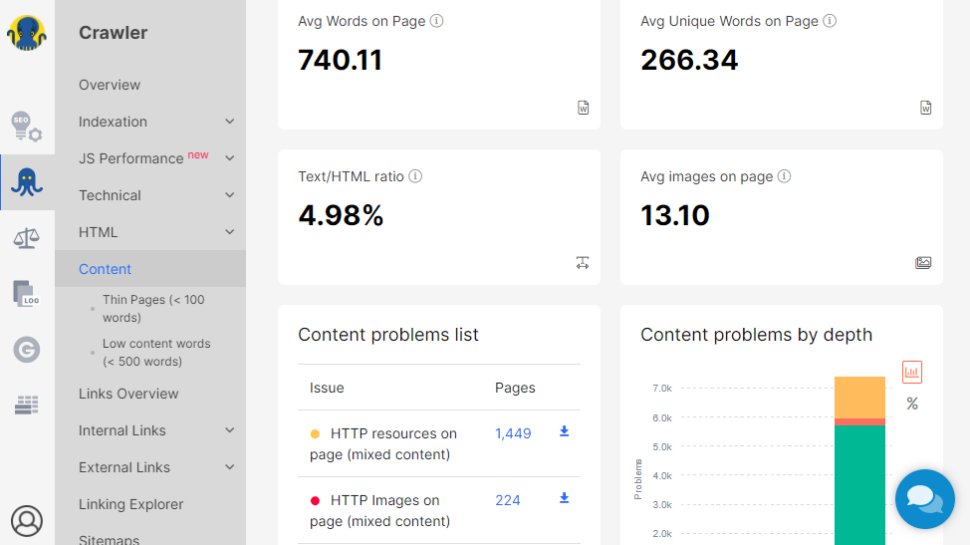
Jetoctopus: Final Verdict
Jetoctopus is a clean and easy to use SEO tool, which remains focused on covering analytics from a range of different angles. While more expensive SEO platforms such as Ahrefs offer a more comprehensive set of tools, and the cheaper Screamingfrog offers some similar functionality, Jetoctopus offers a little more than either when it comes to on-page SEO analytics. The bigger question is how useful that will be for many people.
We were a little skeptical of Jetoctopus when beginning this review, as it seemed a little pricey for yet another analytics tool that doesn’t offer all of the wider features of big names we’re used to. However, after spending a week testing and pushing its functionality, it’s clear that it is a useful standalone platform in itself, and definitely worth considering.
One limitation is the number of URLs that can be crawled or analyzed via logs, as Jetoctopus is going to be overkill for very small websites, but may become expensive for larger ecommerce websites. There is a free trial so you can test out the functionality for yourself.
Overall, we’re not convinced SEO agencies will find Jetoctopus useful when they are already likely to be subscribed to a big platforms such as Ahrefs or SEMrush. However, in terms of web designers and web developers, as well as small business owners, we can see it providing the most value for these groups – ones who don’t need a full range of SEO tools, just something to cover essential on-page issues and analytics to ensure the websites they manage are performing as required.
- We've featured the best SEO tools.
0 comments:
Post a Comment